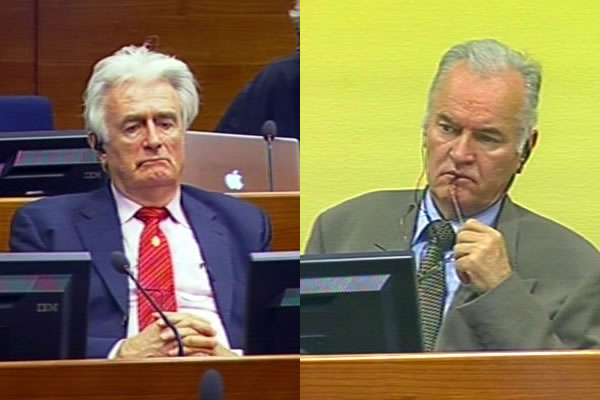Home
MLADIC SUBPOENAED TO TESTIFY IN KARADZIC’S DEFENSE
The Trial Chamber has granted Radovan Karadzic’s motion and will issue a binding order to Ratko Mladic compelling him to testify in Karadzic’s defense. If Mladic refuses to appear in court and answer the questions of the parties, he could face contempt of court charges
 Radovan Karadzic and Ratko Mladic in the courtroom
Radovan Karadzic and Ratko Mladic in the courtroom Ratko Mladic, former commander of the Republika Srpska Army Main Staff, has been given a binding order compelling him to testify at the trial of the erstwhile president and the supreme commander of the VRS, Radovan Karadzic. Mladic refused to testify in the defense of his former war-time partner, purportedly for fear that he might end up incriminating himself. Mladic and Karadzic are charged with the same crimes. Mladic’s ill health was another reason why he didn’t want to appear in the witness stand.
The judges rejected Mladic’s argument, recalling the Appeals Chamber decision denying Zdravko Tolimir’s request to be relieved of the obligation to testify in Karadzic’s defense. The Appeals Chamber noted in its decision that the witness could always refuse answering if he thought the answer would incriminate him. If the Trial Chamber compels the witness to reply anyway, the evidence cannot be used against him.
As far as Mladic’s health was concerned, based on the medical reports in the confidential annex to the order, the judges concluded Mladic was able to testify. He attends his own trial four days a week, the judges noted, adding they were willing to accommodate Mladic’s health-related demands in terms of scheduling his evidence. The Trial Chamber also concluded that the evidence in the case against Karadzic wouldn’t disturb Mladic’s preparations for his defense case. Mladic is slated to testify in January 2014, in the middle of the long break at his trial.
The judges will issue a subpoena only if the applicant has proven that all steps have been taken to secure the evidence of a potential witness and specifically that the witness’s evidence is relevant for the case. The correspondence between the two accused, submitted to the Trial Chamber, convinced the judges that Karadzic had indeed taken all the necessary measures to convince Mladic to appear in court. Also, the judges found that Mladic’s evidence – at least on some of the issues – would be relevant for the trial. One of the issues is whether Mladic informed Karadzic about various events, such as the mass executions in Srebrenica, or the sniper and artillery incidents in Sarajevo.
Mladic can refuse to give evidence under subpoena, as General Radislav Krstic has done. However, in that case, Mladic faces contempt of court charges. According to the Tribunal’s jurisprudence, he could be sentenced to several months in prison.
Mladic is not the first Bosnian Serb military general to refuse to cooperate with Karadzic. The Trial Chamber has already issued binding orders to some of them, including Radivoje Miletic, Ljubomir Beara and Zdravko Tolimir. The Trial Chamber rejected Karadzic’s motion for a subpoena to be issued to a former judge of the Banja Luka Military Court, Nikola Tomasevic. The judges concluded that the information Tomasevic had could be obtained from other sources.
Radovan Karadzic and Ratko Mladic are tried separately, but their indictments are almost identical. They are both charged with double genocide and other crimes against non-Serbs in BH.
Linked Reports
- Case : Karadzic
- 2013-12-10 EYEWITNESS TO ALL KARADZIC’S ‘CONSPIRACY THEORIES’
- 2013-12-09 WITNESS WANTED TO TESTIFY FOR PROSECUTION, ENDED UP TESTIFYING FOR KARADZIC
- 2013-12-09 ‘HUMANITARIAN’ AGENCY ORGANIZED EXODUS
- 2013-12-12 TWO TRIBUNAL’S CONVICTS TESTIFY IN KARADZIC’S DEFENSE
- 2013-12-13 PROS AND CONS OF ‘STAND-BY COUNSEL’
- 2013-12-17 KARADZIC WANTS ASSANGE
